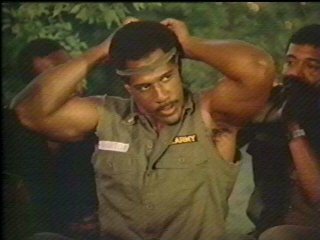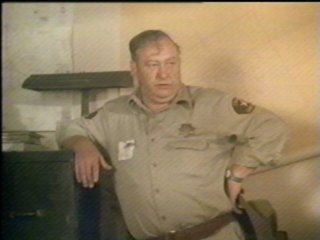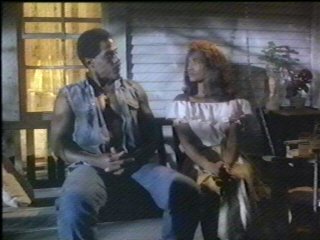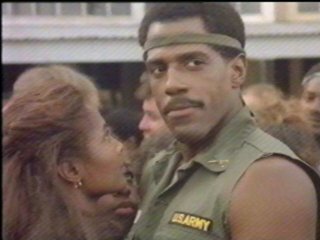
|
|
|
|
|
|
|
|
|
|
|
|
|
(1989) Director: Sam
Firstenberg
It's a sad comment on Hollywood - not just for the "A"
studios, but the "B" studios as well - that a talented actor like Steve
James never Yes, I am convinced that the reason James never was able to break out and become a big star was due to the racism of Hollywood producers. Maybe it wasn't an intentional racism, but their feeling that people wouldn't go see a movie with him as a star just can't be accepted. They might claim that there weren't that many famous black actors then. Maybe so... though maybe it was because they were reluctant to actually give a number of struggling black actors a break. Anyway, it is a testament to James' talents and his not-giving-up that he was actually able to form a sizable cult before his death. For example, people did not overlook his contributions to the American Ninja movies; even today, if you read reviews or comments from ordinary people about these movies, it is very likely there will be some positive remark about James, more so than the white leads he easily outacted. It also says a lot about James that his awful Street Hunter (which he also wrote), managed to do solid business for over a month in the one inner city theater in the U.S. it was released to. It was also probably due to the fact James got a rare opportunity to play the lead role with that movie. It was his second - and final - opportunity to play a lead. A year earlier, he played the lead in Riverbend, a movie that has largely been forgotten despite the James cult remaining to this day. It's not a perfect movie, but it delivers enough, and gives us a chance to see what James could have been had he been given the chance. Riverbend was directed by action veteran
Sam Firstenberg, who a few years earlier had directed Avenging
Force, a movie James hated for reasons that become At this point, you are probably thinking that Quentin, Turner, and Marx decide to do the expected thing, do it, and walk out of town into the sunset with a bunch of bullet-riddled bodies behind them. After all, that's what Brotherhood Of Death did (and just as badly as the rest of the movie, I must add.) The movie, having a surprising more realistic viewpoint on the situation, understands that the town's problem is too complex for a simple solution like that. Quentin and his friends might easily be able to kill the sheriff, but that in itself may do little to change the oppressive atmosphere; it will still be heavily fuelled by indifference and outright hatred by other whites, in or not in positions of authority. And in another realistic touch, the main reason the three fugitives decide to help out the black citizens of Riverbend is not because they feel any particular great sympathy to their black brothers and sisters. Instead, they figure that bringing national attention to Riverbend will give them national attention as well, and the resulting media coverage will embarrass the military enough to get them to drop the charges. And their plan is one no press outlet would pass up the opportunity to write about; after secretly giving basic training to the black men of Riverbend, subsequently take over the town in one swift strike and imprison all the white citizens, then seal off the town from the outside until the Governor agrees to act. When the plan is put into effect, the movie continues
its seeming determination not to provide any simple answers. The
Governor's office takes the first news of this revolution of sorts as a
joke. Even when the highway patrol Even the action sequences that involve martial arts come across in a manner that feels close to how it would come across in real life. Unlike in the American Ninja movies, the fights are not super-acrobatic and rat-tat-tat paced. The fighters here are more prone to keep their guard up and only striking when they are certain. Their punches and kicks are less elaborate, but that doesn't mean the blows are less powerful. There's a real viciousness to these fights, and this is one film where you can almost feel the blows that are inflicted. James deserves much of the credit for this. Already skilled in the martial arts, he is at ease with the basic moves making up the fight choreography, and is able to pull them off with lightning speed. Not only that, with each blow he also makes sure to throw in some acting, with facial expressions that suggest the intensity he's putting in his moves. It also looks friggin' cool - hell, that's no surprise, since James was a friggin' cool guy. He made the most of this rare opportunity to play a leading role, not just with the fight sequences. James obviously took the time to give a good amount of polish to his character's speech and mannerisms, a wise approach for the role of a high-ranking military officer. When he is addressing his troops or taking charge of a situation, there is nothing in what he says or does that doesn't suggest a true authority figure. Totally confident and prepared for anything that may come, he's an absolutely magnetic action hero. Ironically, even though James got a lead role and makes
a terrific impression with it, his performance all the same gets almost
overshadowed by one from another There are some other unconvincing elements to be found in Riverbend. It's a bit hard to believe Bell, who has been widowed for only a day or so when Quentin arrives, quickly falls in love with him. (At least the movie kind of admits this, when Bell's subsequent visit to her husband's grave has her mention this fact during her take on the standard but-I-really-love-him graveside monologue.) Such things really didn't concern me too much. About the only real big problem I found was that the movie took far too long to get going; the first part of the movie pre-revolution moves a bit too slow for its own good, and is needlessly padded out with scenes of Sheriff Jake going around to various people and making threats. However, things pick up considerably once the revolution starts, and the movie remains engaging until the terrible song that plays during the end credits ("I've got feelings just like you / Why can't you take me as I am / Love brings us together / Love takes away the pain, etc.") Yet the movie's weaknesses somehow seem appropriate being here, giving the movie a nice rough edge like those classic drive-in movies. In fact, it's amazing in how many ways the movie does resemble a drive-in movie; not just in the plot, but in the photography, camera angles, locations, period detains, and a lot more. Even if you were never lucky enough to go to the drive-in, don't be surprised if you feel a sudden and pleasant wave of nostalgia come over you while you're already being very entertained by this obscurity. Check for availability on Amazon (VHS) See also: Duel At Diablo, Sunday In The Country, Trouble Man |
 managed to reach the audience he so deserved.
James had everything it took to be a great action star - good looks and
a body to match, considerable skill in the martial arts, and a natural
charisma. To top it off, unlike most action stars he could actually act.
But apparently none of this did much to help him advance in his acting
career. If you look at his filmography, you'll see that many of his
roles were simply bit parts. Then there were several movies where he
played one of the members of a team, like the Cannon movies The
Delta Force and P.O.W. The Escape. In fact, he
did a number of movies for Cannon, and that's where he did almost all
of his best-known movies. Though not as the star - he was usually made
to play the sidekick. He played the sidekick to Michael Dudikoff in Avenging
Force, American Ninja, and American Ninja
2. When Dudikoff passed on American Ninja 3, it
seemed that James would be promoted and be the new star of the series.
But that was not to be; instead, Cannon got rising star (ha!) David
Bradley to play that role, and James once again was saddled with the
role of sidekick. This was possibly the biggest insult even given to
James. The casting of Bradley seemed to confirm what just about all
Hollywood producers seemed to be thinking: "You can't be a star,
because you're BLACK."
managed to reach the audience he so deserved.
James had everything it took to be a great action star - good looks and
a body to match, considerable skill in the martial arts, and a natural
charisma. To top it off, unlike most action stars he could actually act.
But apparently none of this did much to help him advance in his acting
career. If you look at his filmography, you'll see that many of his
roles were simply bit parts. Then there were several movies where he
played one of the members of a team, like the Cannon movies The
Delta Force and P.O.W. The Escape. In fact, he
did a number of movies for Cannon, and that's where he did almost all
of his best-known movies. Though not as the star - he was usually made
to play the sidekick. He played the sidekick to Michael Dudikoff in Avenging
Force, American Ninja, and American Ninja
2. When Dudikoff passed on American Ninja 3, it
seemed that James would be promoted and be the new star of the series.
But that was not to be; instead, Cannon got rising star (ha!) David
Bradley to play that role, and James once again was saddled with the
role of sidekick. This was possibly the biggest insult even given to
James. The casting of Bradley seemed to confirm what just about all
Hollywood producers seemed to be thinking: "You can't be a star,
because you're BLACK." clear upon watching
it. With them reunited, and considering both the subject matter here
and how James is allowed to handle it, I couldn't help but wonder if
Firstenberg intended the movie as a kind of apology to James. Another
thing I couldn't help but notice was that the story had
more than a passing resemblance to an almost totally forgotten
blaxploitation movie, Brotherhood Of Death, a regional
production just like this one. It plays like that movie with just a few
minor changes, though adding an extra act or two after the point where
the older movie finished. Like that movie, Riverbend
involves three Vietnam vets - here being Major Quentin (James), Turner
(Alex Morris, I Come In Peace), and Marx (Julius Tennon, Dead
Man's Walk) - who are traveling through the Deep South. Though this
time, the vets are being transported by MPs to await a court martial, a
trumped-up charge coming from their refusal to hush up about a military
embarrassment. While crossing Georgia, they escape, soon stumbling
across the small town of Riverbend, where they press recent widow Bell
(Avery, The Color Purple) to shelter them. They soon
find out the helpless black citizens of Riverbend have for years been
terrorized by the murderous and rapist Sheriff Jake (Frank, Streets
Of Laredo), supported in part by white citizens either giving him
support or being too afraid to act.
clear upon watching
it. With them reunited, and considering both the subject matter here
and how James is allowed to handle it, I couldn't help but wonder if
Firstenberg intended the movie as a kind of apology to James. Another
thing I couldn't help but notice was that the story had
more than a passing resemblance to an almost totally forgotten
blaxploitation movie, Brotherhood Of Death, a regional
production just like this one. It plays like that movie with just a few
minor changes, though adding an extra act or two after the point where
the older movie finished. Like that movie, Riverbend
involves three Vietnam vets - here being Major Quentin (James), Turner
(Alex Morris, I Come In Peace), and Marx (Julius Tennon, Dead
Man's Walk) - who are traveling through the Deep South. Though this
time, the vets are being transported by MPs to await a court martial, a
trumped-up charge coming from their refusal to hush up about a military
embarrassment. While crossing Georgia, they escape, soon stumbling
across the small town of Riverbend, where they press recent widow Bell
(Avery, The Color Purple) to shelter them. They soon
find out the helpless black citizens of Riverbend have for years been
terrorized by the murderous and rapist Sheriff Jake (Frank, Streets
Of Laredo), supported in part by white citizens either giving him
support or being too afraid to act. confirms the news,
and afterwards when someone from the army (T.J. Kennedy, JFK)
arrives and finds his first infiltration unit driven back, the side of
law and order still doesn't seem to fully take the situation seriously.
Adding unseen complications are internal problems that start brewing
within the revolutionary ranks, and put the whole scheme in danger of
falling apart. Of course, this results in a number of action sequences,
but again, the movie surprises us by also treating the action sequences
in a more realistic way. Take the sequence where several soldiers
attempt to sneak into the town during the night, and are spotted by
some guards. The guards have the advantage of cover, but since they
have shotguns instead of rifles, they don't inflict as much damage on
the soon-retreating soldiers as they might have done in another movie.
It isn't any less exciting, since director Firstenberg shows the
struggle and desperation of the individuals on each side in the
sequence. While the other firearm-oriented action scenes may not be as
emotional, they still come across as more believable than in other
movies. Since they don't come across as live-action cartoons, you can't
help but take them seriously because they are serious.
confirms the news,
and afterwards when someone from the army (T.J. Kennedy, JFK)
arrives and finds his first infiltration unit driven back, the side of
law and order still doesn't seem to fully take the situation seriously.
Adding unseen complications are internal problems that start brewing
within the revolutionary ranks, and put the whole scheme in danger of
falling apart. Of course, this results in a number of action sequences,
but again, the movie surprises us by also treating the action sequences
in a more realistic way. Take the sequence where several soldiers
attempt to sneak into the town during the night, and are spotted by
some guards. The guards have the advantage of cover, but since they
have shotguns instead of rifles, they don't inflict as much damage on
the soon-retreating soldiers as they might have done in another movie.
It isn't any less exciting, since director Firstenberg shows the
struggle and desperation of the individuals on each side in the
sequence. While the other firearm-oriented action scenes may not be as
emotional, they still come across as more believable than in other
movies. Since they don't come across as live-action cartoons, you can't
help but take them seriously because they are serious. actor in the movie. It's thanks to
Tony Frank that the character of Sheriff Jake is such an incredibly
vile and hateful slimebag. His character isn't written much to be
beyond the kind of evil character in good ol' boy movies who inflicts
mayhem on innocent people as a kind of hobby, and being totally
unrepentant about it. He not only drips with Southern sweat (there
seems to be a permanent sweat stain on the back of his uniform), he
drips slime with his actions. There is always a trace of mocking in his
voice, that constantly hits that certain tone of voice that seems to
aggravate just about anyone who ever hears something delivered in that
manner. His casual body positioning and movements show no fear or
defense from anyone he encounters face-to-face. Even when he isn't seen
being involved in something highly unlawful, you can tell he's someone
not to be messed with. It's then curious as to why many of the
Riverbend residents decide to do some really stupid things when he's
around. There's the guy who walks into town - alone - to
deliver a list of the sheriff's wrongdoings to the circuit judge.
(Guess what happens to him.) Then there's the guy who walks out of a
house carrying a gun, wanting to fire on the sheriff and his redneck
friends - despite the fact he could see the sheriff and his boys
already pointing guns towards the house even before stopping to aim his
gun. (Guess what happens to him.)
actor in the movie. It's thanks to
Tony Frank that the character of Sheriff Jake is such an incredibly
vile and hateful slimebag. His character isn't written much to be
beyond the kind of evil character in good ol' boy movies who inflicts
mayhem on innocent people as a kind of hobby, and being totally
unrepentant about it. He not only drips with Southern sweat (there
seems to be a permanent sweat stain on the back of his uniform), he
drips slime with his actions. There is always a trace of mocking in his
voice, that constantly hits that certain tone of voice that seems to
aggravate just about anyone who ever hears something delivered in that
manner. His casual body positioning and movements show no fear or
defense from anyone he encounters face-to-face. Even when he isn't seen
being involved in something highly unlawful, you can tell he's someone
not to be messed with. It's then curious as to why many of the
Riverbend residents decide to do some really stupid things when he's
around. There's the guy who walks into town - alone - to
deliver a list of the sheriff's wrongdoings to the circuit judge.
(Guess what happens to him.) Then there's the guy who walks out of a
house carrying a gun, wanting to fire on the sheriff and his redneck
friends - despite the fact he could see the sheriff and his boys
already pointing guns towards the house even before stopping to aim his
gun. (Guess what happens to him.)